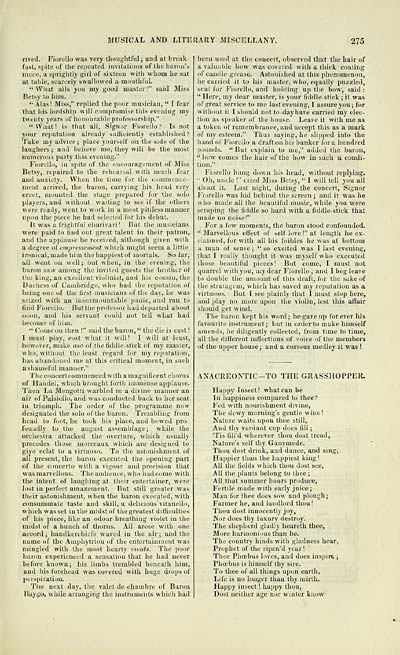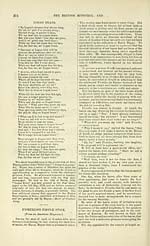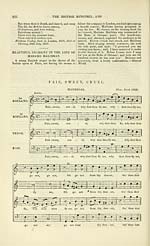Glen Collection of printed music > Printed music > British minstrel, and musical and literary miscellany
(613) Page 275
Download files
Complete book:
Individual page:
Thumbnail gallery: Grid view | List view

MUSICAL AND LITERARY MISCELLANY.
275
nved. Fiorello was very thoughtful; and at break-
fast, spite of the repeated invitatious of the barou'j
niei-e, a sprightly girl of sixteen with whom he sat
at table, scarcely swallowed a mouthful.
"What ails you my good master?" said Miss
Betsy to him.
'• Alas! Miss," replied the poor musician, " I fear
that his lordship will compromise this evening my
twenty years of honourable professorship."
"What! is that all, Signor Fiorello? Is not
your reputation already sulliciently estahlished?
Take my advice ; place yourself on the side of the
laughers ; and believe me, they will be the most
numerous party this evening."
Fiorello, iu spite of the encouragement of Bliss
Betsy, repaired to the rehearsal with much fear
and anxiety. When the time for the commence-
ment arrived, the baron, carrying his head very
erect, mounted the stage prepared for the solo
players, and without waiting to see if the others
were ready, went to work in a most pitiless manner
upon the piece he had selected tor his debut.
It was a frightful charivari! But the musicians
were paid to lind out great talent in their patron,
and the applause he received, although given with
a degree o( cmpressement which might seem a little
irimical, made him the ha]]piest of mortals. So far,
all went on well ; but when, in the evening, the
baron saw among the invited guests the brolhtr ol
the king, an excellent violinist, and his cousin, the
Duchess of Cambridge, who had the reputation of
being one of the first nmsicians of the day, he was
seized with an insurmountable panic, and ran to
lind Fiorello. But the professor had departed about
noon, and his servant could not tell what had
become of him.
" Come on then !" said the baron, " the die is cast !
I must play, cost what it will! I will at least,
however, make use of the fiddlestick of my master,
who, without the least regard for my reputation,
has ahaudiiued me at this critical moment, in such
ashameful manner."
The eoncertcomraenced with a magnificent chorus
of Handel, which brought forth immense applause.
Then La Mengotti warbled in a divine manner an
air of Paisiello, and was conducted back to her seat
iu triumph. The order of the programme now
designated the solo of the baron. Trembling from
head to foot, he took his place, and bowed pro-
foundly to the august assemblage; while the
orchestra attacked the overture, which usually
precedes those morceaux which are designed to
give eclat to a virtuoso. To the astonishment of
all present, the baron executed the opening part
of the concerto with a vigour and precision that
was marvellous. The audience, who had come with
the intent of laughing at their entertainer, were
lost in perfect amazement. But still greater was
their astonishment, when the baron executed, with
consummate taste and skill, a delicious vitanello,
which was set in the midst of the greatest difficulties
of his piece, like an odour-breathing violet in the
midst of a bunch of thorns. All arose with one
accord; handkerchiefs waved in the air; and the
name of the Amphytrion of the entertainment was
mingled with the most hearty vivats. The poor
baron experienced a sensation that he had never
before known; his limbs trembled beneath him,
and his forehead was covered with huge drops of
perspiration.
The next day, the valet-de-chambre of Baron
Uayaoj while arranging the instruments which had
been used at the concert, observed that the hair of
a valuable bow was covered with a thick coating
of candle-grease. Astonished at this phenomenon,
he carried it to his master, who, equally puzzled,
sent for Ficnelio, and holding up the bow, said:
" Here, my dear master, is your fiddlestick ; it was
of great service to me last evening, I assure you; for
without it I should not to-day have carried my elec-
tion as speaker of the house. Leave it with me as
a token of remembrance, and accept this as a mark
of my esteem." Thus saying, he slipped into the
hand of Fiorello a draft on his banker for a hundred
pounds. " But explain to me," added the baron,
" how comes the hair of the bow in such a condi-
tion."
Fiorello hnng down his head, without replying.
■' Oh, uncle !" cried Miss Betsy, " I will tell you all
about it. Last night, during the concert, Signor
Fiorello was hid behind the screen ; and it was he
who made all the beautiful music, while you were
scraping the fiddle so hard with a fiddle-stick that
made no noise!"
For a few moments, the baron stood confounded.
" Blarvellous effect of self-love !" at length he ex-
claimed, for with all his foibles he was at bottom
a man of sense ; " so excited was I last evening,
that I really thought it was myself who executed
those beautiful pieces! But come, I must not
quarrel with you, my dear Fiorello; and I beg leave
to double the amount of this draft, lor the sake of
the stratagem, which has saved my reputation as a
virtuoso. But I see plainly that I must stop here,
and play no more upon the violin, lest this all'air
should get wind.
The baron kept his word; he-gave up forever his
favourite instrument ; but in order to make himself
amends, he diligently collected, from time to time,
all the different inflections of voice of the members
of the upper house; and a curious medley it was !
ANACREONTIC— TO THE GRASSHOPPER.
Happy Insect! what can be
In happiness compared to thee?
Fed with nourishment divine,
The dewy morning's gentle wine!
Nature waits upon thee still.
And thy verdant cup does fill ;
'Tis fiird wherever thou dost tread,
Nature's self thy Ganymede.
Thou dost drink, and dance, and sing,
Happier than the happiest king!
All the fields which thou dost see,
All the plants belong to thee;
All that summer hours produce,
Fertile made with early juice;
Man for thee does sow and plough;
Farmer he, and landlord thou!
Thou dost innocently joy,
Nor does thy luxury destroy.
The shepherd gladly heareth thee.
More harmonious than he.
The country hinds with gladness hear,
Prophet of the ripen'd year !
Thee Phoebus loves, and does inspire ;
Phoebus is himself thy sire.
To thee of all things upon earth,
Life is no longer than thy mirth.
Happy insect ! happy thou,
Dost neither age nor winter know
275
nved. Fiorello was very thoughtful; and at break-
fast, spite of the repeated invitatious of the barou'j
niei-e, a sprightly girl of sixteen with whom he sat
at table, scarcely swallowed a mouthful.
"What ails you my good master?" said Miss
Betsy to him.
'• Alas! Miss," replied the poor musician, " I fear
that his lordship will compromise this evening my
twenty years of honourable professorship."
"What! is that all, Signor Fiorello? Is not
your reputation already sulliciently estahlished?
Take my advice ; place yourself on the side of the
laughers ; and believe me, they will be the most
numerous party this evening."
Fiorello, iu spite of the encouragement of Bliss
Betsy, repaired to the rehearsal with much fear
and anxiety. When the time for the commence-
ment arrived, the baron, carrying his head very
erect, mounted the stage prepared for the solo
players, and without waiting to see if the others
were ready, went to work in a most pitiless manner
upon the piece he had selected tor his debut.
It was a frightful charivari! But the musicians
were paid to lind out great talent in their patron,
and the applause he received, although given with
a degree o( cmpressement which might seem a little
irimical, made him the ha]]piest of mortals. So far,
all went on well ; but when, in the evening, the
baron saw among the invited guests the brolhtr ol
the king, an excellent violinist, and his cousin, the
Duchess of Cambridge, who had the reputation of
being one of the first nmsicians of the day, he was
seized with an insurmountable panic, and ran to
lind Fiorello. But the professor had departed about
noon, and his servant could not tell what had
become of him.
" Come on then !" said the baron, " the die is cast !
I must play, cost what it will! I will at least,
however, make use of the fiddlestick of my master,
who, without the least regard for my reputation,
has ahaudiiued me at this critical moment, in such
ashameful manner."
The eoncertcomraenced with a magnificent chorus
of Handel, which brought forth immense applause.
Then La Mengotti warbled in a divine manner an
air of Paisiello, and was conducted back to her seat
iu triumph. The order of the programme now
designated the solo of the baron. Trembling from
head to foot, he took his place, and bowed pro-
foundly to the august assemblage; while the
orchestra attacked the overture, which usually
precedes those morceaux which are designed to
give eclat to a virtuoso. To the astonishment of
all present, the baron executed the opening part
of the concerto with a vigour and precision that
was marvellous. The audience, who had come with
the intent of laughing at their entertainer, were
lost in perfect amazement. But still greater was
their astonishment, when the baron executed, with
consummate taste and skill, a delicious vitanello,
which was set in the midst of the greatest difficulties
of his piece, like an odour-breathing violet in the
midst of a bunch of thorns. All arose with one
accord; handkerchiefs waved in the air; and the
name of the Amphytrion of the entertainment was
mingled with the most hearty vivats. The poor
baron experienced a sensation that he had never
before known; his limbs trembled beneath him,
and his forehead was covered with huge drops of
perspiration.
The next day, the valet-de-chambre of Baron
Uayaoj while arranging the instruments which had
been used at the concert, observed that the hair of
a valuable bow was covered with a thick coating
of candle-grease. Astonished at this phenomenon,
he carried it to his master, who, equally puzzled,
sent for Ficnelio, and holding up the bow, said:
" Here, my dear master, is your fiddlestick ; it was
of great service to me last evening, I assure you; for
without it I should not to-day have carried my elec-
tion as speaker of the house. Leave it with me as
a token of remembrance, and accept this as a mark
of my esteem." Thus saying, he slipped into the
hand of Fiorello a draft on his banker for a hundred
pounds. " But explain to me," added the baron,
" how comes the hair of the bow in such a condi-
tion."
Fiorello hnng down his head, without replying.
■' Oh, uncle !" cried Miss Betsy, " I will tell you all
about it. Last night, during the concert, Signor
Fiorello was hid behind the screen ; and it was he
who made all the beautiful music, while you were
scraping the fiddle so hard with a fiddle-stick that
made no noise!"
For a few moments, the baron stood confounded.
" Blarvellous effect of self-love !" at length he ex-
claimed, for with all his foibles he was at bottom
a man of sense ; " so excited was I last evening,
that I really thought it was myself who executed
those beautiful pieces! But come, I must not
quarrel with you, my dear Fiorello; and I beg leave
to double the amount of this draft, lor the sake of
the stratagem, which has saved my reputation as a
virtuoso. But I see plainly that I must stop here,
and play no more upon the violin, lest this all'air
should get wind.
The baron kept his word; he-gave up forever his
favourite instrument ; but in order to make himself
amends, he diligently collected, from time to time,
all the different inflections of voice of the members
of the upper house; and a curious medley it was !
ANACREONTIC— TO THE GRASSHOPPER.
Happy Insect! what can be
In happiness compared to thee?
Fed with nourishment divine,
The dewy morning's gentle wine!
Nature waits upon thee still.
And thy verdant cup does fill ;
'Tis fiird wherever thou dost tread,
Nature's self thy Ganymede.
Thou dost drink, and dance, and sing,
Happier than the happiest king!
All the fields which thou dost see,
All the plants belong to thee;
All that summer hours produce,
Fertile made with early juice;
Man for thee does sow and plough;
Farmer he, and landlord thou!
Thou dost innocently joy,
Nor does thy luxury destroy.
The shepherd gladly heareth thee.
More harmonious than he.
The country hinds with gladness hear,
Prophet of the ripen'd year !
Thee Phoebus loves, and does inspire ;
Phoebus is himself thy sire.
To thee of all things upon earth,
Life is no longer than thy mirth.
Happy insect ! happy thou,
Dost neither age nor winter know
Set display mode to: Large image | Transcription
Images and transcriptions on this page, including medium image downloads, may be used under the Creative Commons Attribution 4.0 International Licence unless otherwise stated. ![]()
| Special collections of printed music > Glen Collection of printed music > Printed music > British minstrel, and musical and literary miscellany > (613) Page 275 |
|---|
| Permanent URL | https://digital.nls.uk/91442301 |
|---|
| Description | Scottish songs and music of the 18th and early 19th centuries, including music for the Highland bagpipe. These are selected items from the collection of John Glen (1833 to 1904). Also includes a few manuscripts, some treatises, and other books on the subject. |
|---|
| Description | The Glen Collection and the Inglis Collection represent mainly 18th and 19th century Scottish music, including Scottish songs. The collections of Berlioz and Verdi collected by bibliographer Cecil Hopkinson contain contemporary and later editions of the works of the two composers Berlioz and Verdi. |
|---|

